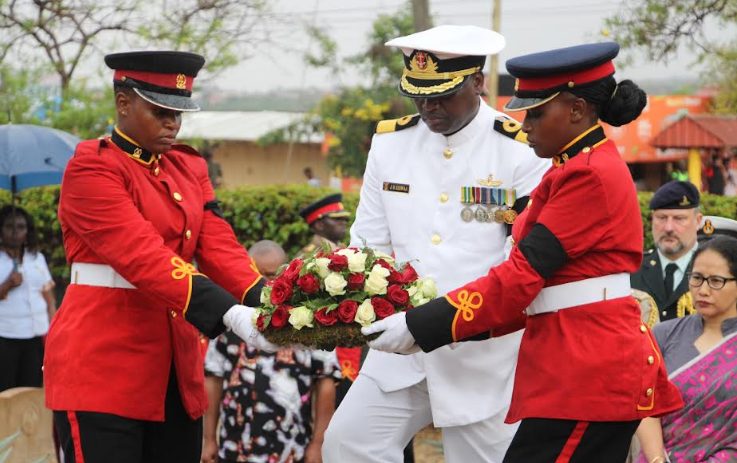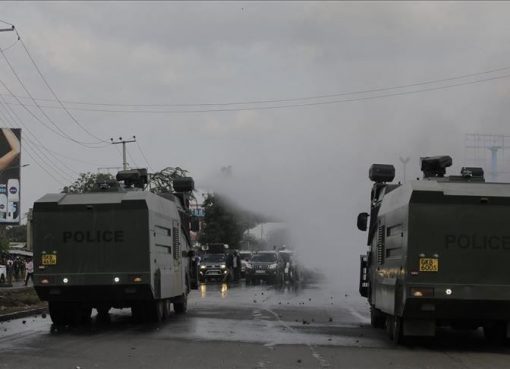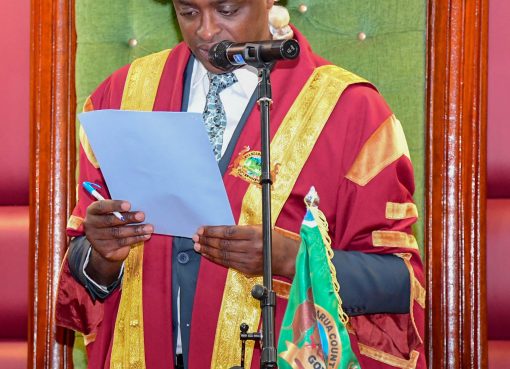Efforts to identify the fallen African soldiers who fought and died during World War I are underway.
Speaking on Saturday in Taveta during the 8th commemoration of the fallen soldiers at the Commonwealth War Graves Cemetery in Taveta, the Deputy Commander of the Kenya Navy, Brigadier John Kiswaa, emphasised the importance of identifying the African soldiers who fought and died during World War I, especially those who participated in the East African campaign.
Brigadier Kiswaa highlighted the ongoing effort to trace and recognise these soldiers, pointing out that many African soldiers and porters who served in the war remain unidentified, stating that their sacrifice is not in vain.
“Of good to note is that we had African soldiers and also those Africans who participated as porters to support the war in terms of logistic support, and many of them lost their lives. They paid the ultimate price, but not in vain because the peace that we enjoy today is because of them,” said Brigadier Kiswaa.
He disclosed that strides have been made in identifying the African fallen soldiers alongside the porters, confirming that 12 names have already been identified.
“There’s an ongoing exercise to try as much as possible to identify those soldiers of African descent. And you remember there were many from different African countries, particularly of the Commonwealth. And in due course, I’m sure we’ll try and trace them one by one. I think by now we have about 12 names that we already have,” he stated.
The two-day commemoration event began with ceremonies in Voi and Maktau before concluding in Taveta and was marked by a strong presence of residents and representatives from several countries, including ambassadors, diplomats, and military attaches from various Commonwealth nations.
The event paid tribute to the bravery of the soldiers who fought in the East African theatre of the war, with many paying the ultimate price in service to a cause they did not fully understand.
While the event recognised the soldiers’ sacrifices, it also served as a call to action for greater public awareness of the region’s historical significance.
Historian and retired hotelier Willie Mwadilo emphasised that Taita Taveta County, particularly the sites in and around Taveta, holds invaluable lessons about the World War I East African campaign.
Mwadilo called on both the local government and the national authorities to do more to promote the region’s history, which he believes could become a major tourist attraction and educational resource.
“The event commemoration this year looks low-key, the reason being we’ve not given it a lot of publicity. Much that it is being handled directly by KDF, Taita Taveta County needs to step in and leverage it, put up some advertisements, and talk about it because this is a tourist product. Also, it is something that should make the community gain. We don’t hear a lot being talked about the museum in Taita Hills. That should be the beginning point,” Mwadilo stated.
He reiterated that the county has several important war sites, including the museum at Taita Hills and the battlefields around Voi and Taveta, which are authentic and irreplaceable, yet they are not as well-known as they should be.
“I would like to request the county government and all the bodies, as well as the government itself, to step in and help develop these sites. This product doesn’t need to be developed. It’s already there. What it needs is to be enhanced, and being enhanced is by everybody coming in, and we pull resources together,” explained Mwadilo.
Meanwhile, the historian specifically pleaded for greater attention to the Kasigau area, which he believes bore the brunt of the fighting in the region.
He called on the government to take the necessary steps to ensure that Kasigau’s story is told and that its role in the war is properly recognised.
“Talking about World War I in Taita Taveta, we keep on leaving out Kasigau. It is actually the people of Kasigau who faced the biggest brunt of the war around here. In the future, we need to recognise them. We need to go and talk about Kasigau, and apart from that, we also need to see how the government can step in and create something that will attract people to go and see Kasigau as a town on its own,” he added, stating that it’s crucial not just to remember the soldiers but also to acknowledge the towns and areas that were affected by the war.
On his part, the curator of the World War I Museum at Taita Hills Resort and Spa, Donald Mwakio, echoed Mwadilo’s call for greater promotion of the region’s historical attractions.
Mwakio noted that although the museum and the surrounding sites, such as Mile 27 and Fort Mashotti, had once attracted a steady stream of visitors, recent years have seen a decline in tourism due to limited local marketing.
He believes that more needs to be done to raise awareness, especially within the local community, so that the next generation can appreciate the significance of these sites.
“We are trying our level best to maintain our historical sites. We have two sites in the sanctuary which were involved in the First World War. We have Mile 27 where the First World War took place, and a lot of souls were lost there. The war pitted the German party, which actually attacked an armoured train from Bura heading to Maktau. Apart from that one, we have Fort Mashotti, which is within the Taita Hills sanctuary,” Mwakio explained.
Local resident Joki Mohoho, who travelled from Nairobi to attend the commemoration, shared her thoughts on the need for Kenyans to better understand and appreciate their own history, particularly the events surrounding World War I.
Mohoho expressed her frustration with the fact that, despite the importance of these sites, many Kenyans seem unaware of their significance.
“I came here together with my friends because I wanted to learn more about our own history. We know so much about other historical events, like the French Revolution, but we don’t learn nearly enough about our own past. Why is it that foreigners are here with diplomats and military attaches, but as Kenyans, we stand outside the cemetery like we’re not invited? What is stopping us from coming in and learning about the people who fought for our peace?” Mohoho said.
Mohoho emphasised the need for a shift in education, calling for greater emphasis on local history and the recognition of the sacrifices made by Africans during the war.
She said that visiting the cemeteries and learning about these forgotten heroes is a crucial step toward understanding the true nature of Kenya’s past.
In his closing remarks, Brigadier Kiswaa reiterated the importance of the commemoration as an opportunity to remember the soldiers who fought in World War I and to highlight the ongoing efforts to identify those who remain unnamed. He also emphasised that the Kenya Defence Forces (KDF) and the government were committed to ensuring that the history of these soldiers is preserved for future generations.
“We will continue with the efforts to identify the African soldiers who fought in the war. As we progress, we will continue to recognise their contributions, and it is our duty to ensure that these heroes are remembered,” Brigadier Kiswa assured the attendees.
The call for more local involvement, greater government support, and increased public awareness was emphasized to ensure that the legacy of Kenya’s involvement in World War I is never forgotten.
By Arnold Linga Masila





